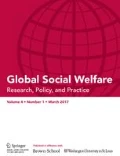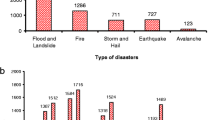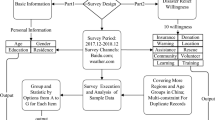Abstract
The main purpose of this study was to assess the level of knowledge, attitude, and practice (KAP) of flood-affected communities toward volunteerism. The study focused on a gender perspective to show the level of differences. The study followed a quantitative approach to collect, analyze, and present the data. A total of 410 samples were randomly selected for the study. A structured questionnaire with bivariate and multivariate indicators was used to collect data. Chi-square test, t-test, central tendency analysis, and variance analysis were performed to assess the differences between female and male responses. Results showed that there is a significant difference between female and male community members in terms of knowledge and attitude toward flood volunteerism. Female members were more aware of flood-related impacts (p < 0.05) and were more knowledgeable of the importance of flood volunteers (p < 0.05). On the other hand, male members were more interested to become flood volunteers (p < 0.05) and had skills to share with others (p < 0.001). The study did not find any significant differences in practices related to flood volunteerism between men and women. The study is conducted to show the importance of communities in flood risk management. A community with a higher level of knowledge, attitude, and practice toward flood volunteerism can be a great resource. None of the participants of the study had any training on flood volunteerism which is a major area where policies can be developed. The research indicated some policy-level implications which are implementable and attainable for ensuring a resilient country.
Similar content being viewed by others
Data Availability
The data will be made available on request.
References
Al-Mueed, M., Chawdhery, M. R. A., Harera, E., Alhazmi, R. A., Mobrad, A. M., Althunayyan, S. M., & Al-Wathinani, A. M. (2021). Potential of community volunteers in flood early warning dissemination: A case study of Bangladesh. International Journal of Environmental Research and Public Health, 18(24), 13010. https://doi.org/10.3390/ijerph182413010
Aoyagi, Y., Beck, C. R., Dingwall, R., & Nguyen-Van-Tam, J. S. (2015). Healthcare workers’ willingness to work during an influenza pandemic: A systematic review and meta-analysis. Influenza and Other Respiratory Viruses, 9(3), 120–130. https://doi.org/10.1111/irv.12310
Azad, A. K., Hossain, K. M., & Nasreen, M. (2013). Flood-induced vulnerabilities and problems encountered by women in northern Bangladesh. International Journal of Disaster Risk Science, 4(4), 190–199. https://doi.org/10.1007/s13753-013-0020-z
Bangladesh Planning Commission. (2018). Bangladesh Delta Plan 2100. Ministry of Planning Government of the People’s Republic of Bangladesh, 55, 1–42.
Berk, R. A. (1974). Societal causes of collective behavior-Kornhauser, Smelser and related perspectives. In Collective behavior (pp. 36–53). W. C. Brown Co.
Britton, N. R. (1991). Permanent disaster volunteers: Where do they fit? Nonprofit and Voluntary Sector Quarterly, 20(4), 395–414.
Carlile, J. A., Mauseth, K., Clark, N. E., Cruz, J. L., & Thoburn, J. W. (2014). Local volunteerism and resilience following large-scale disaster: Outcomes for health support team volunteers in Haiti. International Journal of Disaster Risk Science, 5(3), 206–213. https://doi.org/10.1007/s13753-014-0028-z
Chakraborty, U., & Bhat, S. (2018). The effects of credible online reviews on brand equity dimensions and its consequence on consumer behavior. Journal of Promotion Management, 24(1), 57–82. https://doi.org/10.1080/10496491.2017.1346541
Chisty, M. A., Dola, S. E. A., Khan, N. A., & Rahman, M. M. (2021a). Intersectionality, vulnerability and resilience: Why it is important to review the diversifications within groups at risk to achieve a resilient community. Continuity & Resilience Review, 3(2), 119–131. https://doi.org/10.1108/CRR-03-2021-0007
Chisty, M. A., Nazim, A., Rahman, Md. M., Dola, S. E. A., & Khan, N. A. (2021b). Disability inclusiveness of early warning system: A study on flood-prone areas of Bangladesh. Disaster Prevention and Management: An International Journal, 30(4/5), 494–509. https://doi.org/10.1108/DPM-05-2021-0177
Chisty, M. A., Rahman, Md. M., Khan, N. A., & Dola, S. E. (2022). Assessing community disaster resilience in flood-prone areas of Bangladesh: From a gender lens. Water, 14(1). https://doi.org/10.3390/w14010040
Clary, E. G., Snyder, M., Ridge, R. D., Copeland, J., Stukas, A. A., Haugen, J., & Miene, P. (1998). Understanding and assessing the motivations of volunteers: A functional approach. Journal of Personality and Social Psychology, 74(6), 1516–1530. https://doi.org/10.1037//0022-3514.74.6.1516
Daily Disaster Report. (2022). National Disaster Response Coordination Center (NDRCC), pp. 1–8.
District Statistics 2011: Kurigram. (2013). Bangladesh Bureau of Statistics.
Ellis, S. J., & Campbell, K. N. (1990). By the people: A history of Americans as volunteers | WorldCat.org. In Jossey-Bass. Jossey-Bass Publishers.
Fathi, S., & Kassem, A. (2021). Investigating attitudes and feelings towards volunteering: A comparison of Arab and non-Arab students. Eurasian Journal of Educational Research, 96(96), 1–13. https://doi.org/10.14689/ejer.2021.96.1
Floro, G. K. (1989). Book Reviews: Mapping the third sector: Voluntarism in a changing social economy, by Jon Van Til. New York: Foundation Center, 1988. 270 pp., $24.95 paper. Nonprofit and Voluntary Sector Quarterly, 18(2), 194–196. https://doi.org/10.1177/089976408901800211
Forbes, K. F., & Zampelli, E. M. (2012). Volunteerism: The influences of social, religious, and human capital. Nonprofit and Voluntary Sector Quarterly, 43(2), 227–253. https://doi.org/10.1177/0899764012458542
Ganesh, S., & McAllum, K. (2011). Volunteering and professionalization: Trends in tension? Management Communication Quarterly, 26. https://doi.org/10.1177/0893318911423762
Ibsen, B. (2022). The significance of nonformal education for volunteers. Journal of Nonprofit Education and Leadership, 12(1). https://doi.org/10.18666/JNEL-2020-10760
Islam, M. A., Chisty, M. A., Fuad, A., Rahman, Md. M., Muhtasim, M., Dola, S. E. A., Biva, F. J., & Khan, N. A. (2022). Using ARC-D toolkit for measuring community resilience to disasters. Sustainability, 14(3), 1758. https://doi.org/10.3390/su14031758
Kankanamge, N., Yigitcanlar, T., Goonetilleke, A., & Kamruzzaman, M. (2019). Can volunteer crowdsourcing reduce disaster risk? A systematic review of the literature. International Journal of Disaster Risk Reduction, 35, 101097. https://doi.org/10.1016/j.ijdrr.2019.101097
Lazarus, G., Findyartini, A., Putera, A. M., Gamalliel, N., Nugraha, D., Adli, I., Phowira, J., Azzahra, L., Ariffandi, B., & Widyahening, I. S. (2021). Willingness to volunteer and readiness to practice of undergraduate medical students during the COVID-19 pandemic: A cross-sectional survey in Indonesia. BMC Medical Education, 21(1), 138. https://doi.org/10.1186/s12909-021-02576-0
Liu, S. B. (2014). Crisis crowdsourcing framework: Designing strategic configurations of crowdsourcing for the emergency management domain. Computer Supported Cooperative Work (CSCW), 23(4), 389–443. https://doi.org/10.1007/s10606-014-9204-3
Macias, W., Hilyard, K., & Freimuth, V. (2009). Blog functions as risk and crisis communication during hurricane Katrina. Journal of Computer-Mediated Communication, 15(1), 1–31. https://doi.org/10.1111/j.1083-6101.2009.01490.x
Mansour, A., Alharbi, S., Almutiri, E., Almutiri, M., Almutairi, A., & Alharbi, A. (2020). Knowledge, attitudes, and willingness of medical students to volunteer in a disaster at Unaizah College of Medicine, Qassim University, Saudi Arabia. International Journal of Medicine in Developing Countries, 4(July), 1198–1207. https://doi.org/10.24911/ijmdc.51-1591758178
Murthy, D. (2013). New media and natural disasters. Information, Communication & Society, 16(7), 1176–1192. https://doi.org/10.1080/1369118X.2011.611815
Nasreen, M. (2012). Vulnerable or resilient? Institute of Disaster Management and Vulnerability Studies, University of Dhaka.
Neuman, W. L. (2014). Social research methods: Qualitative and quantitative approaches (7. ed., Pearson new internat. ed). Pearson.
Palen, L., & Hughes, A. L. (2018). Social media in disaster communication BT - handbook of disaster research (H. Rodríguez, W. Donner, & J. E. Trainor, Eds.; pp. 497–518). Springer International Publishing. https://doi.org/10.1007/978-3-319-63254-4_24
Rahman, M. M., Khan, S. J., Tanni, K. N., Roy, T., Chisty, M. A., Islam, M. R., Rumi, M. A. A. R., Sakib, M. S., Quader, M. A., Bhuiyan, M.-U.-I., Rahman, F., Alam, E., & Islam, A. R. M. T. (2022a). Knowledge, attitude, and practices towards dengue fever among university students of Dhaka City, Bangladesh. International Journal of Environmental Research and Public Health, 19(7), 4023. https://doi.org/10.3390/ijerph19074023
Rahman, Md. M., Nabila, I. A., Sakib, M. S., Silvia, N. J., Galib, M. A., Shobuj, I. A., Hasan, L., Chisty, M. A., Rahman, F., Alam, E., & Islam, A. R. M. T. (2022b). Knowledge, attitude, and practices towards lightning in Bangladesh. Sustainability, 14(1), 448. https://doi.org/10.3390/su14010448
Reuter, C., Heger, O., & Pipek, V. (2013). Combining real and virtual volunteers through social media. ISCRAM 2013 Conference Proceedings, pp. 780–790. http://idl.iscram.org/files/reuter/2013/874_Reuter_etal2013.pdf
Rodell, J. B., Breitsohl, H., Schröder, M., & Keating, D. J. (2016). Employee volunteering: A review and framework for future research. Journal of Management, 42(1), 55–84. https://doi.org/10.1177/0149206315614374
Saffer, A. J. (2018). Value‐Added Theory. In R. L. Heath & W. Johansen, The international encyclopedia of strategic communication (1st ed., pp. 1–10). Wiley. https://doi.org/10.1002/9781119010722.iesc0197
Sarker, M. N. I., Alam, G. M. M., Firdaus, R. B. R., Biswas, J. C., Islam, A. R. M. T., Raihan, M. L., Hattori, T., Alam, K., Joshi, N. P., & Shaw, R. (2022). Assessment of flood vulnerability of riverine island community using a composite flood vulnerability index. International Journal of Disaster Risk Reduction, 82, 103306. https://doi.org/10.1016/j.ijdrr.2022.103306
Scanlon, J., Joseph, H., & I., & Groenendaal, J. (2014). Putting it all together: Integrating ordinary people into emergency response. International Journal of Mass Emergencies and Disasters, 32, 42–63.
Schutt, R. K. (2019). Investigating the social world: the process and practice of research (9th ed.). SAGE.
Shi, M., Xu, W., Gao, L., Kang, Z., Ning, N., Liu, C., Liang, C., Sun, H., Jiao, M., Liang, L., Li, Y., Cui, Y., Zhao, X., Fei, J., Wei, Q., Yi, M., Hao, Y., & Wu, Q. (2018). Emergency volunteering willingness and participation: A cross-sectional survey of residents in northern China. BMJ Open, 8(7), e020218. https://doi.org/10.1136/bmjopen-2017-020218
Smelser, N. J. (2011). Theory of collective behavior (2nd ed.). Quid Pro.
Smith, D. H. (1981). Altruism, volunteers, and volunteerism. Journal of Voluntary Action Research, 10(1), 21–36. https://doi.org/10.1177/089976408101000105
Snyder, M., & Maki, A. (2015). Volunteerism, psychology of. In International Encyclopedia of the Social & Behavioral Sciences (pp. 268–272). https://doi.org/10.1016/B978-0-08-097086-8.22021-7
Tejada, J. J., & Punzalan, J. R. B. (2012). On the Misuse of Slovin’s Formula., 61(1), 8.
Whittaker, J., Mclennan, B., & Handmer, J. (2015). A review of informal volunteerism in emergencies and disasters: Definition, opportunities and challenges. International Journal of Disaster Risk Reduction, 13. https://doi.org/10.1016/j.ijdrr.2015.07.010
Wilson, J., & Janoski, T. (1995). The contribution of religion to volunteer work. Sociology of Religion, 56(2), 137. https://doi.org/10.2307/3711760
Acknowledgements
The study acknowledges the support of the Centennial Research Grant (CRG) program of the University of Dhaka for providing funds for the study. The funding was used to collect and analyze the data. The study also acknowledges the support of the respondents, data enumerators, data analysts, research assistants, and local government agencies.
Author information
Authors and Affiliations
Contributions
All authors have contributed equally to the development of this paper.
Corresponding author
Ethics declarations
Competing Interests
The authors declare no competing interests.
Additional information
Publisher's Note
Springer Nature remains neutral with regard to jurisdictional claims in published maps and institutional affiliations.
Rights and permissions
Springer Nature or its licensor (e.g. a society or other partner) holds exclusive rights to this article under a publishing agreement with the author(s) or other rightsholder(s); author self-archiving of the accepted manuscript version of this article is solely governed by the terms of such publishing agreement and applicable law.
About this article
Cite this article
Chisty, M.A., Khan, N.A., Dola, S.E.A. et al. Knowledge, Attitude, and Practice Toward Flood Volunteerism in Bangladesh: A Gender-Based Analysis with Policy Implications. Glob Soc Welf 10, 225–233 (2023). https://doi.org/10.1007/s40609-023-00276-9
Accepted:
Published:
Issue Date:
DOI: https://doi.org/10.1007/s40609-023-00276-9




